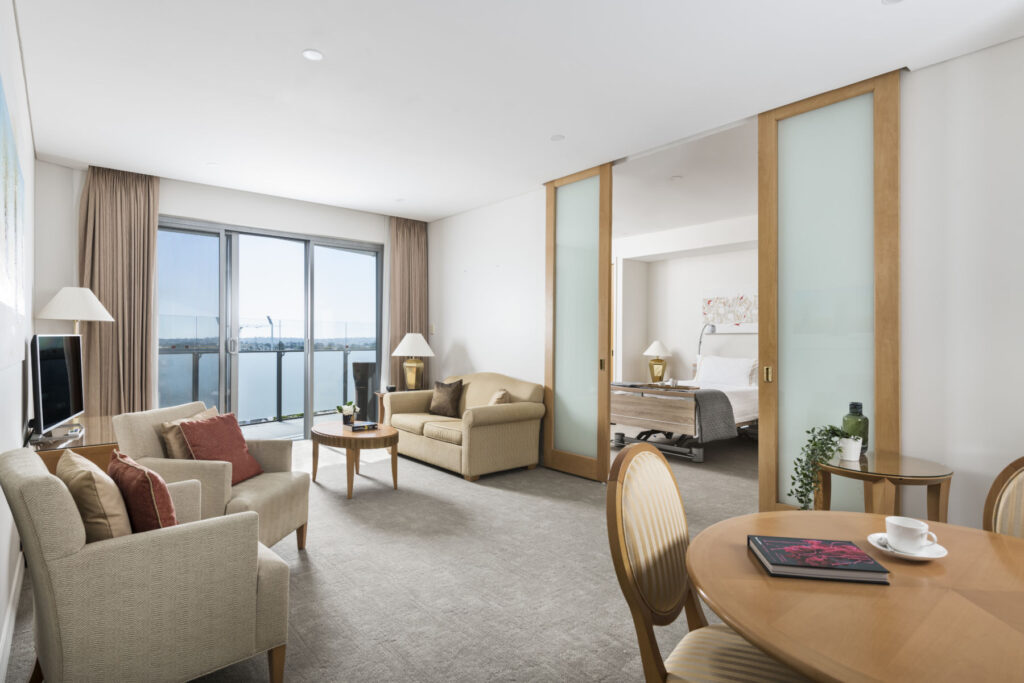How to have the conversation about aged care with parents and loved ones
“Great conversations are not always easy, but they have the power
to create understanding, connection and transformative change”
Discussing the prospect of residential aged care is undoubtedly challenging, but it is crucial to plan ahead to avoid difficult decisions during times of crisis. When our elderly loved ones face health challenges and haven’t expressed their wishes beforehand, families often find themselves under tremendous stress.
To help you navigate this sensitive topic with your ageing loved one, we’ve prepared a thoughtful guide that aims to ease the conversation.
Approach with Care: Share a Cup of Tea
When you observe your loved one exhibiting signs that they require additional support, it might be time to discuss future options. Perhaps their memory is faltering, or they struggle with tasks that were once effortless. Feelings of loneliness, isolation, or mourning the loss of a partner could also prompt the need for discussion. During these moments, it’s essential to approach the topic gently, creating a calm atmosphere.
Sit down together and initiate the conversation with these gentle questions:
1. How are you feeling about living here on your own?
2. How do you feel you are coping with the house?
3. Is there anything you are finding more difficult?
4. I am here to support you and help you look at support available, would you be interested in this?
5. Have any of your friends moved into residential aged care? What are your thoughts on this?
6. I want you to be in control should you need or wish to move in to a place that provides support. There are some truly wonderful places now that provide the opportunity for socialising and activities in beautiful environments, would you like to have a look at what options there might be?
A trusted health professional, like a community social worker or GP can assist with discussing the topic of aged care. MyAgedCare.com.au can arrange an assessment by the Aged Care Assessment Team (ACAT) for suitability / eligibility approvals for both home care and residential aged care. This approval is known in the industry as the “passport” into aged care.
For more information on ACAT assessments and eligibility click here.
It may also be a good time to discuss appointing Enduring Power of Attorney and Enduring Power of Guardianship in the event that your loved one is no longer capable of making decisions for themselves. An appointed guardian must understand a loved ones wishes relating to health and an appointed Attorney must understand the financials in order to act in the best interest of your loved one. Discussing Advanced Health Directive can provide clarity on their medical preferences.
Embracing Independence: There’s no place like home
Leaving one’s home and moving to an unfamiliar environment can be overwhelming, with concerns about losing independence being prevalent among older individuals. At Oryx residences – The Richardson Aged Care, The Queenslea Aged Care and The Queenslea Retirement Living Apartments, we empower our residents to lead vibrant lives while maintaining as much independence as possible.
If residential aged care isn’t immediately necessary but your loved one requires modifications for better accessibility, security, or improved social interactions, The Queenlsea Retirement Living Apartments are an excellent option. Designed specifically for Seniors, these apartments offer full accessibility and a Platinum Certification for Livability. Residents can maintain their independence while accessing in-home support services, including meals, cleaning, laundry, and personal care. Additionally, the emergency call-bell connects to Registered Nurses located at neighbouring The Queenslea Aged Care, fostering a sense of community.
A Home Away from Home
In situations where staying at home is no longer feasible due to round-the-clock care requirements or a proactive decision to transition to residential aged care, understanding the process can help you select the most suitable home for your loved one.
Consider the following steps:
1. Engage your loved one in a discussion about their preferences for their new home. Would they like a balcony? Do they desire a single private room, or would they prefer a larger space like a suite or penthouse with a private lounge and kitchenette? Is standard of food important to them? What about the offer of social activities? Is an Intergenerational program available or the option to partake in rehabilitation or reablement physiotherapy?
2. Explore locations that align with your loved one’s and your preferences. Seek recommendations from professionals or friends, and create a shortlist of potential homes in your desired areas.
3. Ensure that your loved one has obtained Residential Permanent and Residential Respite Approval from ACAT.
4. During the tours, ask as many questions as you need to make an informed decision. If you require guidance, here are a list of questions to ask during your visit.
5. Consider enlisting the assistance of an aged care-specific financial advisor to determine the best funding approach for your loved one’s residential care.
If you are looking for a light-hearted and practical guide to assisting your ageing parents, pick up a copy of the book written by Australian actor & comedian, Jean Kittson, ‘We Need to Talk about Mum & Dad’.
Embrace the Next Chapter with Joy
Although broaching the topic of aged care can be challenging, remember that the search for the right home can be a positive experience. Use this time as an opportunity to connect with and support your loved one, ensuring that this next chapter is filled with laughter, love, and companionship.
At Oryx, we have a dedicated team that can guide you through the process. If you would like to speak to someone about your situation or that of a loved one, or to tour through one of our residences, please contact us today.



